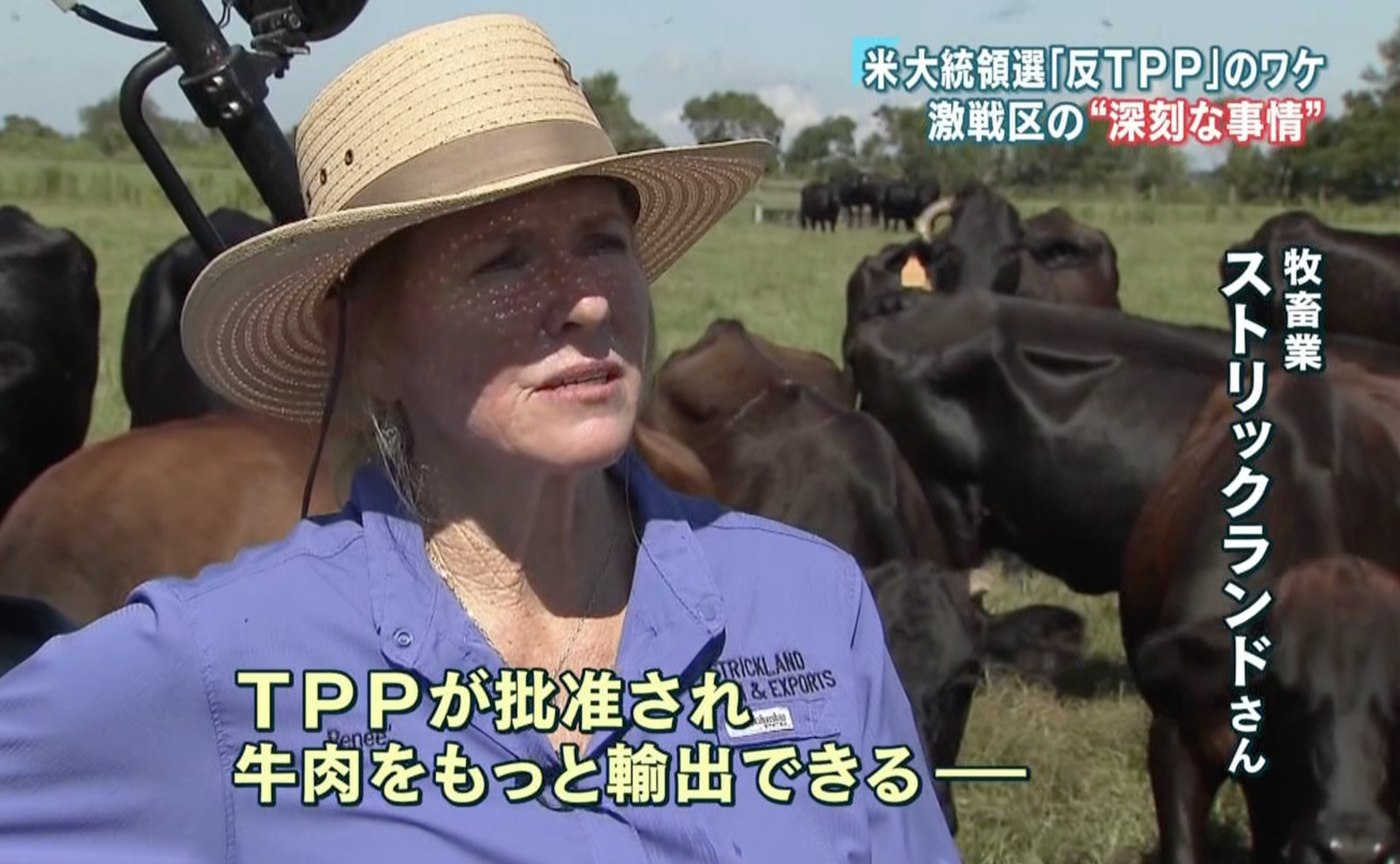Reneé Strickland weighs in on TPP and its role in the 2016 election on Japanese news program

Scroll below for an approximate translation.
STUDIO INTRO: We’re now less than two weeks away from the US presidential election. One of the issues being debated is the Trans-Pacific Partnership, or TPP, which Japan is also deeply involved in. As deliberation begins in earnest in this country, both Hillary Clinton and Donald Trump have expressed opposition to the deal, making it unclear whether the deal will be ratified. What is behind this situation?
–Cut to Strickland Ranch in Florida—
RENEE STRICKLAND: Come on! There ya go!
VO: This is Renee Strickland. She owns a cattle ranch in the state of Florida. As her business faces a down cycle due to low beef prices domestically, she is hoping the TPP will open up new markets overseas.
RENEE STRICKLAND: You know, if TPP were to pass, and we can get on a fair trading system to where we can export more beef, then obviously it’s going to actually help me as a producer.
VO: The TPP involves 12 countries including the United States and Japan, and each country has already begun debating ratification of the deal. However, Ms. Strickland has concerns over the direction this debate has taken in the United States.
RENEE STRICKLAND: I hope that one of these two candidates realizes that if they go with the union and decide to not support TPP, that they are abandoning agriculture.
–Cut to scene from the third presidential debate—
DONALD TRUMP: Now she wants to sign Trans-Pacific Partnership, and that will be as bad as NAFTA.
HILLARY CLINTON: I’m against it now, I’ll be against it at the election, I’ll be against it when I’m president.
VO: Why is such an insular mentality taking root now in the United States, the country that was supposed to be leading the charge in the TPP?
–Cut to scene from early voting in Youngstown, Ohio—
SHOTA STAND-UP: Early voting has begun in this industrial town in the battleground state of Ohio. On many of these voters’ minds: The economy.
VO: Youngstown used to be a vibrant manufacturing town, with good jobs in the steel and automotive industries, but its current population has fallen to 40% of peak levels. Many voters place the blame for that decline on unfair trade deals.
VOTER: Because we’re not sending that much over there, it’s affecting our jobs. There’s no jobs… as many jobs.
VO: The North American Free Trade Agreement, or NAFTA, was signed by the three North American countries in 1992 and ratified the following year, eliminating virtually all tariffs among member nations. Opinion polls show that nearly 60 percent of Ohio voters are opposed to such free trade deals, including Mr. Dan Moore, who works at a local steel mill. His belief that free trade deals lead to vanishing American jobs led him to support Donald Trump for president.
DAN MOORE: There’s a lot of uncertainty about that. How many more bad trade agreements can we afford?
VO: However, a local historian who specializes in the rust belt region points out that such discontent is based on a misinterpretation of history.
PROF. DONNA DEBLASIO: The jobs were gone before NAFTA here, before NAFTA really came in. We were not modernizing our mills, and that was a big problem.
VO: The American economy continues to gradually recover from the Great Recession, but those left behind are attracted to Donald Trump and his rhetoric, as he speaks directly to their economic anxieties.
–Jump to cut of Hillary Clinton—
VO: Meanwhile, Hillary Clinton had shown a favorable attitude toward the TPP, but she began to change her position during the election. The trigger for that…?
SANDERS: It also calls for strong opposition to job-killing trade agreements like the TPP!
VO: One of the main propellants for the campaign of Senator Bernie Sanders– who gave Hillary Clinton a run for her money during the primary campaign– was voters’ anger toward the perceived excesses of capitalism, with free trade as an oft-raised example. Mrs. Clinton could not afford to risk losing the support of Sanders supporters, so she was forced to declare her opposition to the TPP.
VO: At the Japanese Embassy in Washington, DC, officials are closely monitoring these developments. According to one senior diplomat, it will be very difficult for TPP to pass through congress no matter which of the two candidates wins next month. Thus, the ideal scenario would be to pass TPP during the lame duck session.
–Back to Studio–